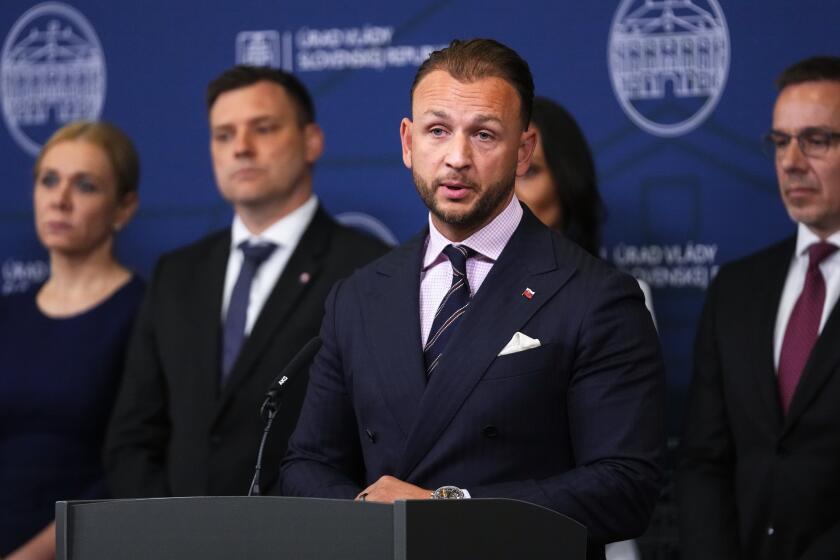War Crimes Tribunals Exact a High Cost
Saddam Hussein is a leader who is willing to subject his people to endless misery in order to maintain power. He is guilty of crimes against humanity. Few would argue otherwise.
The United States is wrong, however, to seek the indictment of Hussein and his closest supporters in an international war crimes tribunal.
In a speech delivered to the Iraqi National Congress in New York on Oct. 29, David Scheffer, the U.S. ambassador-at-large for war crimes issues, listed nine major criminal episodes under Hussein’s rule. At least three, he argued, continue today.
The nine episodes include Iraq’s poison gas attack against its own people at Halabja in 1988, the use of poison gas against Iran during the Iran-Iraq War and the possible human experimentation sanctioned by the regime in the 1990s. Scheffer declared that “the United States government is determined to see this clique of Iraqi criminals stripped of their power and, if possible, brought to justice. . . . That would be far more generous and humane than what they have offered hundreds of thousands of their victims.”
The problem with war crimes tribunals, which have become fashionable for human rights activists and the U.S. Congress, is that they sacrifice the lives of the living in order to provide justice for the dead. By limiting a regime’s incentives for giving up power, war crimes tribunals have the potential to perpetuate the very regimes they target.
Many believe that the indictment of Slobodan Milosevic and four top aides induced the Serbian elite to stick together.
The question to consider when seeking the indictment of key regime officials is whether it increases or decreases the chance of changing the incumbent leadership.
It is unlikely that Gen. Augusto Pinochet of Chile would have given up power if he expected to spend his final days in a British jail prosecuted under European law. That is why the Chilean government allowed him the honorary position of senator-for-life with immunity from prosecution, despite the brutality of his regime. Are the people of Uganda better off with Idi Amin living quietly in Saudi Arabia than they might have been had he expected no safe refuge? Are Hussein’s henchmen more or less likely to abdicate power if they think a tribunal looms in the offing?
Advocates of war crimes tribunals argue that such tribunals raise the price for dictators of perpetrating crimes against humanity and can therefore deter them from undertaking particular actions.
What these advocates fail to recognize is that dictators (like most leaders) tend to think in terms of short-term gains rather than long-term losses. What matters is staying in power today, which for dictators often means coercion and terror. This is why a military deterrent is often effective (it can be deployed immediately) and sanctions are less so (they take time to set in and the pain can be transferred to others).
People who favor war crimes tribunals point to Nuremberg to defend their position, arguing that a small measure of justice was won when the world was able to register its outrage at the mass murder undertaken by the Nazi regime. However, Nuremberg took place after the Nazi regime had been defeated in war and ousted from power. Today, war crime indictments occur while leaders are still in power. Rather than pursuing war crimes indictments, the international community should revoke the visas of those associated with brutal regimes. Iraqi officials should not be allowed to receive benefits abroad while still in power, and Austria was correct to deny medical treatment this summer to one of Hussein’s top deputies.
The lives of such regime officials should be made as difficult as possible while they remain in power, with the promise that things could be better if they abdicated. Freezing bank accounts is another way to do this.
The U.S., however, also should be actively working with its allies to find safe passage deals for the murderous Iraqi regime in return for a complete abdication of power.
Indicting those in power on charges of crimes against humanity makes it less likely that they will cede power and therefore should be avoided at all costs.
Conversely, raising the benefits of leaving power may facilitate the desired transition. This may not satisfy our sense of justice, but it may improve the lives of those living in Iraq. And this is a humane policy outcome worth fighting for.
More to Read
Start your day right
Sign up for Essential California for news, features and recommendations from the L.A. Times and beyond in your inbox six days a week.
You may occasionally receive promotional content from the Los Angeles Times.






